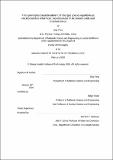First-principles based treatment of charged species equilibria at electrochemical interfaces: model system of zirconium oxide and titanium oxide
Author(s)
Yang, Jing,Ph. D.Massachusetts Institute of Technology.
Download1196095255-MIT.pdf (6.702Mb)
Other Contributors
Massachusetts Institute of Technology. Department of Materials Science and Engineering.
Advisor
Bilge Yildiz.
Terms of use
Metadata
Show full item recordAbstract
Ionic defects are known to influence the magnetic, electronic and transport properties of oxide materials. Understanding defect chemistry provides guidelines for defect engineering in various applications including energy storage and conversion, corrosion, and neuromorphic computing devices. While DFT calculations have been proven as a powerful tool for modeling point defects in bulk oxide materials, challenges remain for linking atomistic results with experimentally-measurable materials properties, where impurities and complicated microstructures exist and the materials deviate from ideal bulk behavior. This thesis aims to bridge this gap on two aspects. First, we study the coupled electro-chemo-mechanical effects of ionic impurities in bulk oxide materials. Second, we develop a modeling framework for describing point defect redistribution at extended defects, including grain boundaries, oxide/oxide interfaces, and oxide/water interfaces. The first part of this thesis deals with zirconium oxide in the context of corrosion of zirconium alloys used as nuclear cladding materials in light water reactors. We provide physically-deduced diffusion coefficients for higher-level modeling as well as better mechanistic understanding of zirconium alloy corrosion by studying defect equilibria in ZrO₂ passive films. A first-principles based model for predicting charged species redistribution profiles at electrochemical interfaces is established and applied to ZrO₂/Cr₂O₃ and ZrO₂/water interfaces, and ZrO₂ grain boundaries. Defect redistribution at these extended defects can lead to significant changes in transport properties of oxides. The second part applies similar methodology to TiO₂ as a model system for studying field-assisted sintering (FAST). FAST has been demonstrated for multiple ceramic materials as a promising sintering technique for shortening consolidation times and lowering sintering temperatures. By studying the defect chemistry of acceptor- and donor-TiO₂ and designing experiments accordingly, we show that while Joule heating is the dominant effect of the applied electric field, the shrinkage rate also correlates strongly with titanium diffusivity. Through donor doping, which increases the concentrations of fast-diffusing titanium interstitials, a higher shrinkage rate is achievable. These results prove that first-principles base calculations are capable of predicting the defect chemistry of oxide materials that quantitatively agree with measured values. Such understanding of defect chemistry gives insights into practical defect engineering strategies that are broadly applicable to electrochemical applications.
Description
This electronic version was submitted by the student author. The certified thesis is available in the Institute Archives and Special Collections. Thesis: Ph. D., Massachusetts Institute of Technology, Department of Materials Science and Engineering, 2020 Cataloged from student-submitted PDF of thesis. Includes bibliographical references (pages 165-174).
Date issued
2020Department
Massachusetts Institute of Technology. Department of Materials Science and EngineeringPublisher
Massachusetts Institute of Technology
Keywords
Materials Science and Engineering.